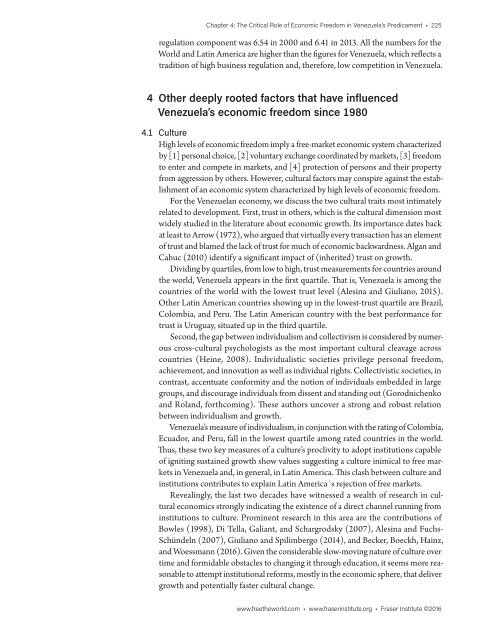Economic Freedom of the World
economic-freedom-of-the-world-2016
economic-freedom-of-the-world-2016
You also want an ePaper? Increase the reach of your titles
YUMPU automatically turns print PDFs into web optimized ePapers that Google loves.
Chapter 4: The Critical Role <strong>of</strong> <strong>Economic</strong> <strong>Freedom</strong> in Venezuela’s Predicament • 225<br />
regulation component was 6.54 in 2000 and 6.41 in 2013. All <strong>the</strong> numbers for <strong>the</strong><br />
<strong>World</strong> and Latin America are higher than <strong>the</strong> figures for Venezuela, which reflects a<br />
tradition <strong>of</strong> high business regulation and, <strong>the</strong>refore, low competition in Venezuela.<br />
4 O<strong>the</strong>r deeply rooted factors that have influenced<br />
Venezuela’s economic freedom since 1980<br />
4.1 Culture<br />
High levels <strong>of</strong> economic freedom imply a free-market economic system characterized<br />
by [1] personal choice, [2] voluntary exchange coordinated by markets, [3] freedom<br />
to enter and compete in markets, and [4] protection <strong>of</strong> persons and <strong>the</strong>ir property<br />
from aggression by o<strong>the</strong>rs. However, cultural factors may conspire against <strong>the</strong> establishment<br />
<strong>of</strong> an economic system characterized by high levels <strong>of</strong> economic freedom.<br />
For <strong>the</strong> Venezuelan economy, we discuss <strong>the</strong> two cultural traits most intimately<br />
related to development. First, trust in o<strong>the</strong>rs, which is <strong>the</strong> cultural dimension most<br />
widely studied in <strong>the</strong> literature about economic growth. Its importance dates back<br />
at least to Arrow (1972), who argued that virtually every transaction has an element<br />
<strong>of</strong> trust and blamed <strong>the</strong> lack <strong>of</strong> trust for much <strong>of</strong> economic backwardness. Algan and<br />
Cahuc (2010) identify a significant impact <strong>of</strong> (inherited) trust on growth.<br />
Dividing by quartiles, from low to high, trust measurements for countries around<br />
<strong>the</strong> world, Venezuela appears in <strong>the</strong> first quartile. That is, Venezuela is among <strong>the</strong><br />
countries <strong>of</strong> <strong>the</strong> world with <strong>the</strong> lowest trust level (Alesina and Giuliano, 2015).<br />
O<strong>the</strong>r Latin American countries showing up in <strong>the</strong> lowest-trust quartile are Brazil,<br />
Colombia, and Peru. The Latin American country with <strong>the</strong> best performance for<br />
trust is Uruguay, situated up in <strong>the</strong> third quartile.<br />
Second, <strong>the</strong> gap between individualism and collectivism is considered by numerous<br />
cross-cultural psychologists as <strong>the</strong> most important cultural cleavage across<br />
countries (Heine, 2008). Individualistic societies privilege personal freedom,<br />
achievement, and innovation as well as individual rights. Collectivistic societies, in<br />
contrast, accentuate conformity and <strong>the</strong> notion <strong>of</strong> individuals embedded in large<br />
groups, and discourage individuals from dissent and standing out (Gorodnichenko<br />
and Roland, forthcoming). These authors uncover a strong and robust relation<br />
between individualism and growth.<br />
Venezuela’s measure <strong>of</strong> individualism, in conjunction with <strong>the</strong> rating <strong>of</strong> Colombia,<br />
Ecuador, and Peru, fall in <strong>the</strong> lowest quartile among rated countries in <strong>the</strong> world.<br />
Thus, <strong>the</strong>se two key measures <strong>of</strong> a culture’s proclivity to adopt institutions capable<br />
<strong>of</strong> igniting sustained growth show values suggesting a culture inimical to free markets<br />
in Venezuela and, in general, in Latin America. This clash between culture and<br />
institutions contributes to explain Latin America´s rejection <strong>of</strong> free markets.<br />
Revealingly, <strong>the</strong> last two decades have witnessed a wealth <strong>of</strong> research in cultural<br />
economics strongly indicating <strong>the</strong> existence <strong>of</strong> a direct channel running from<br />
institutions to culture. Prominent research in this area are <strong>the</strong> contributions <strong>of</strong><br />
Bowles (1998), Di Tella, Galiant, and Schargrodsky (2007), Alesina and Fuchs-<br />
Schündeln (2007), Giuliano and Spilimbergo (2014), and Becker, Boeckh, Hainz,<br />
and Woessmann (2016). Given <strong>the</strong> considerable slow-moving nature <strong>of</strong> culture over<br />
time and formidable obstacles to changing it through education, it seems more reasonable<br />
to attempt institutional reforms, mostly in <strong>the</strong> economic sphere, that deliver<br />
growth and potentially faster cultural change.<br />
www.free<strong>the</strong>world.com • www.fraserinstitute.org • Fraser Institute ©2016


